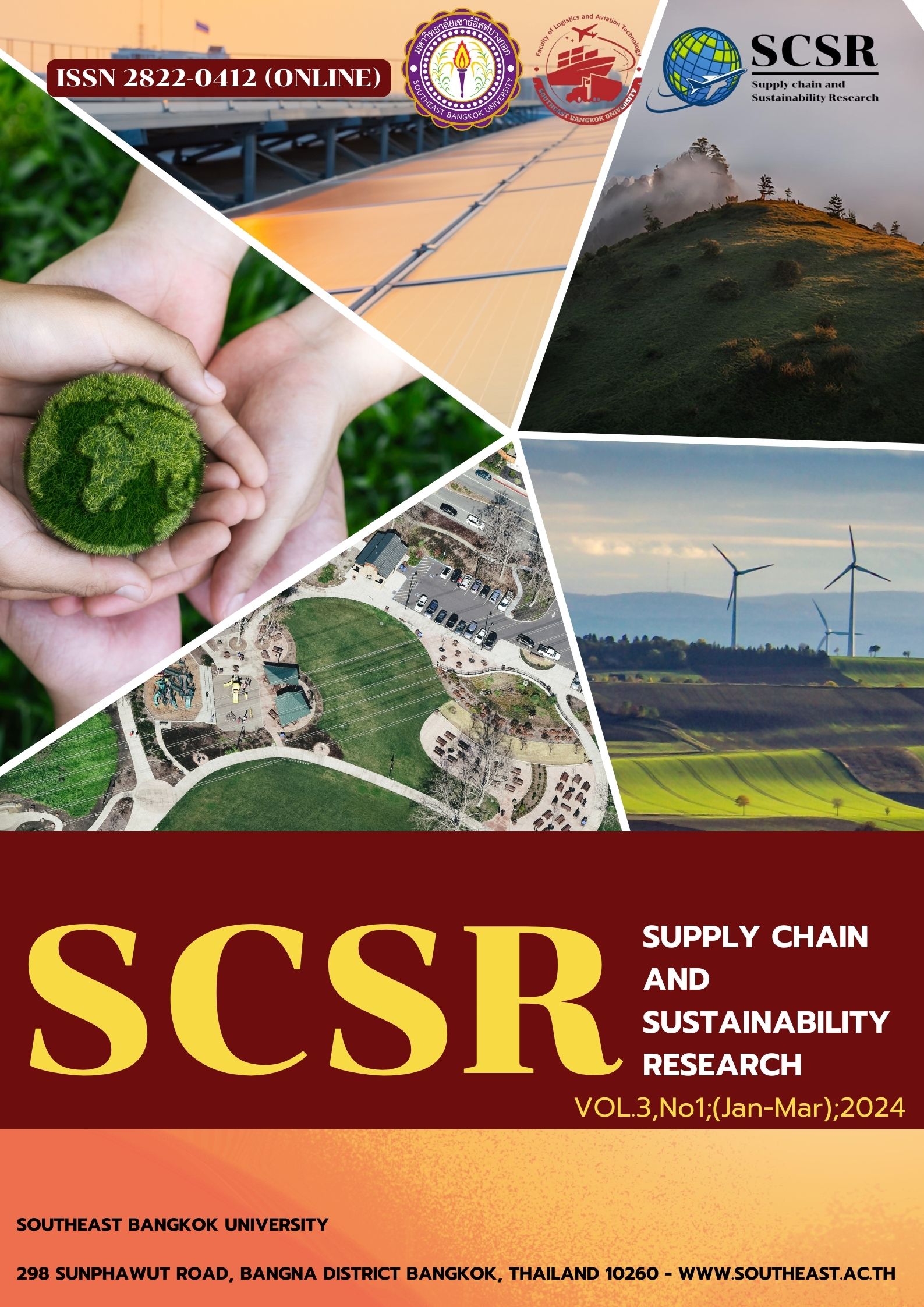An Academic Inquiry into ESG Strategy Communication and the Enhancement of Operational Control within the Supply Chain
Main Article Content
บทคัดย่อ
This study delves into the effective integration of sustainability goals within corporate strategies and supply chain management, focusing on the strategies and practices of ASUS and TSMC in implementing ESG (Environmental, Social, Governance) initiatives and enhancing supply chain operations. ASUS exemplifies how embedding sustainability into corporate culture and decision-making processes can help companies stay competitive globally and foster long-term value growth. It prioritizes diverse options and consumer preferences, sets medium- to long-term sustainability objectives, and views sustainability performance as integral to its economic outcomes. Furthermore, ASUS emphasizes ESG performance to investors and senior management as a catalyst for innovation and value enhancement, revolutionizing supply chain management through the enforcement of a stringent supplier code of conduct and the assessment of supply chain ESG metrics. TSMC, a global semiconductor industry leader, anchors its ESG strategy in robust corporate governance, environmental sustainability promotion, and proactive engagement in social responsibilities. It achieves transparent and equitable decision-making via rigorous corporate governance standards, aims to minimize energy consumption and carbon emissions, and enhances product energy efficiency with cutting-edge technologies. In supply chain management, TSMC enforces strict evaluation and selection protocols for suppliers, mandating adherence to environmental and social standards, and fosters the sustainability of the supply chain through the joint development of sustainable solutions. The analysis of ASUS and TSMC illustrates how companies can proactively undertake social responsibilities and advance environmental sustainability while seeking economic gains through varied methods and focuses. These initiatives not only positively influence their operational performance and brand reputation but also offer invaluable insights for other corporations, particularly in the seamless integration of ESG strategies into corporate culture and operations, and in fortifying sustainability within supply chain management.
Article Details

อนุญาตภายใต้เงื่อนไข Creative Commons Attribution-NonCommercial-NoDerivatives 4.0 International License.
บทความนี้ได้รับการเผยแพร่ภายใต้สัญญาอนุญาต Creative Commons Attribution-NonCommercial-NoDerivatives 4.0 International (CC BY-NC-ND 4.0) ซึ่งอนุญาตให้ผู้อื่นสามารถแชร์บทความได้โดยให้เครดิตผู้เขียนและห้ามนำไปใช้เพื่อการค้าหรือดัดแปลง หากต้องการใช้งานซ้ำในลักษณะอื่น ๆ หรือการเผยแพร่ซ้ำ จำเป็นต้องได้รับอนุญาตจากวารสารเอกสารอ้างอิง
ASUS. (2023). Corporate Sustainability Report. https://esg.asus.com/english/file/ASUS_Detailed_2021_CHN.pdf,2023
Chen, C. C., Wang, Y. R., Wang, Y. C., Lin, S. L., Chen, C. T., Lu, M. M., & Guo, Y. L. L. (2021). Projection of future temperature extremes, related mortality, and adaptation due to climate and population changes in Taiwan. Science of the Total Environment, 760, 143373.
Evans, J., Allan, N., & Cantle, N. (2017). A new insight into the world economic forum global risks. Economic Papers: A journal of applied economics and policy, 36(2), 185-197.
Hák, T., Janoušková, S., & Moldan, B. (2016). Sustainable Development Goals: A needs for relevant indicators. Ecological indicators, 60, 565-573.
Kaplan, R. S., & Norton, D. P. (2004). The strategy map: guide to aligning intangible assets. Strategy & leadership, 32(5), 10-17.
Trenberth, K. E. (2018). Climate change caused by human activities is happening and it already has major consequences. Journal of energy & natural resources law, 36(4), 463-481.
Sciarelli, M., Cosimato, S., Landi, G., & Iandolo, F. (2021). Socially responsible investment strategies for the transition towards sustainable development: The importance of integrating and communicating ESG. The TQM Journal, 33(7), 39-56.
TSMC. (2023). Sustainability Report. https://esg.tsmc.com/download/file/2022_sustainabilityReport/chinese/c-all.pdf
Van Duuren, E., Plantinga, A., & Scholtens, B. (2016). ESG integration and the investment management process: Fundamental investing reinvented. Journal of Business Ethics, 138, 525-533.
Witze, A. (2019). Meet the weather observers on climate change's front lines. Nature, 573(7774), 317-319.
Yeh, W.C. (2021). ASUS Computer Company's Corporate Sustainability Transformation Strategy - An Analysis Using the CSOP Framework.
Yusha’u, M. J. (2021). SDG18—The missing ventilator: An introduction to the 2030 agenda for development. The Palgrave handbook of international communication and sustainable development, 53-75.


